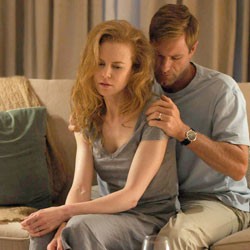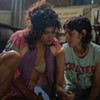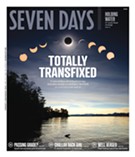Published February 2, 2011 at 10:51 a.m.
Rabbit Hole is a hard sell. Whether you have young children or not, the loss of one isn’t something you want to contemplate. By itself, the film’s premise has about as much mass appeal as the support group that bereaved mother Becca (Nicole Kidman) ditches early in the film. She can’t bear the company of other grieving parents so desperate to find the upside that they tell themselves, “Heaven needed another angel.”
But hold on, because the film isn’t just a wallow in vicarious misery. We may hope never to experience what Becca and her husband, Howie (Aaron Eckhart), are experiencing. But most of us know how it feels to have our lives derailed by a sudden loss or accident or misstep. (The movie’s title refers to the notion of tumbling down Lewis Carroll’s rabbit hole — or a physicist’s wormhole — and finding oneself in an alternate reality.) Most of us have felt grief that makes us ask, as Becca asks her mother (Dianne Wiest), “Does it ever go away?” The film’s answer is, not surprisingly, “Nope.” But it offers low-key affirmations that feel surprisingly solid.
Rabbit Hole is easy on the eyes. John Cameron Mitchell, creator of Hedwig and the Angry Inch and Shortbus, directs with more restraint than one might expect. He stresses everything that’s glossy, lush and verdant about the suburban world where the affluent protagonists live, and he doles out backstory in driblets — we know it’s been eight months since the death of the Corbetts’ 4-year-old son, but not the details.
At first, the film tests our patience by asking us to empathize with people who look, well, perfect. Baking and gardening without a hair out of place, Kidman could be remaking The Stepford Wives (again). Given the cold rebuffs Becca offers everyone — including her husband — she even more strongly calls to mind Mary Tyler Moore’s award-winning turn as the ice-queen mom in Ordinary People (1980). Like that character, Becca refuses to weep or talk about her son — and she tosses his clothes in a Goodwill bin.
When she snips at her way-less-perfect younger sister (Tammy Blanchard), Becca sounds like what she is — an overarticulate character written for the stage. (David Lindsay-Abaire adapted his play of the same name.) When she erases the video clip of their son that Howie watches and rewatches on his cellphone, she just seems awful.
But gradually Kidman’s princessy hauteur melts, her reedy little voice gets deeper and warmer, and we begin to understand her. We discover that Becca’s as mad as she is sad. (When her mom urges her to seek comfort in religion, she calls God a “sadistic prick.”) The tenderness that she denies Howie comes out when she befriends a teenager (Miles Teller), who played a role in the tragedy. It’s a role that plays to Kidman’s established star persona, because she tends to show the camera a china-doll façade. When it cracks, we see something real emerge, and those moments feel revelatory.
Rabbit Hole has a few clunker lines and manipulative elements. When Howie develops a friendship with another grieving parent [Sandra Oh], we know exactly where it’s heading and what the writer is telling us.
But where other movies — Ordinary People among them — deliver a big, teary, theatrical catharsis, this one pulls back and stays real. Mitchell allows the actors’ performances to deliver the emotional payoffs. Hugging a dog (who’s more receptive to affection than Becca), Eckhart tells us all we need to know about Howie’s feelings.
And Wiest has a monologue toward the end that is, in a word, luminous. Her answer to Becca’s question — does the pain ever stop? — seems to arrive on the spur of the moment and surprise even her. It illuminates the muted scene with a mood that shouldn’t be hopeful but is. “Closure,” the filmmakers suggest, is a myth. But, for someone whose plans and dreams have been voided in an instant, putting one foot in front of the other can be a triumph.
More By This Author
Speaking of Movies, movie Review
-

Next Month Brings the Final Curtain for Palace 9 Cinemas
Oct 27, 2023 -

Book Review: 'Save Me a Seat! A Life With Movies,' Rick Winston
Aug 30, 2023 -

Steve MacQueen Named Executive Director of Vermont International Film Festival
May 22, 2023 -

Vermonters Are Going Back to the Movies — Under the Stars
Aug 26, 2020 -

Where to Catch a Movie Near Burlington
Sep 11, 2018 - More »
Comments
Comments are closed.
From 2014-2020, Seven Days allowed readers to comment on all stories posted on our website. While we've appreciated the suggestions and insights, right now Seven Days is prioritizing our core mission — producing high-quality, responsible local journalism — over moderating online debates between readers.
To criticize, correct or praise our reporting, please send us a letter to the editor or send us a tip. We’ll check it out and report the results.
Online comments may return when we have better tech tools for managing them. Thanks for reading.











































